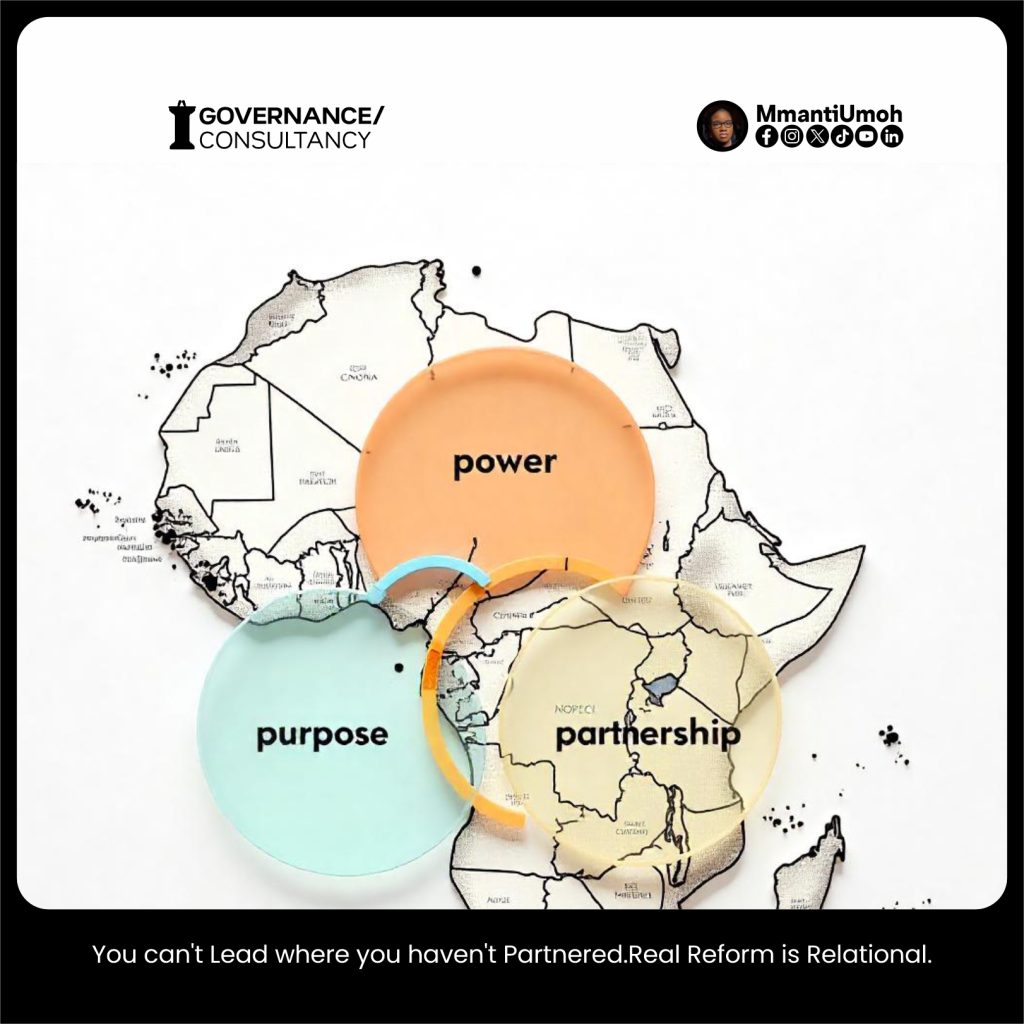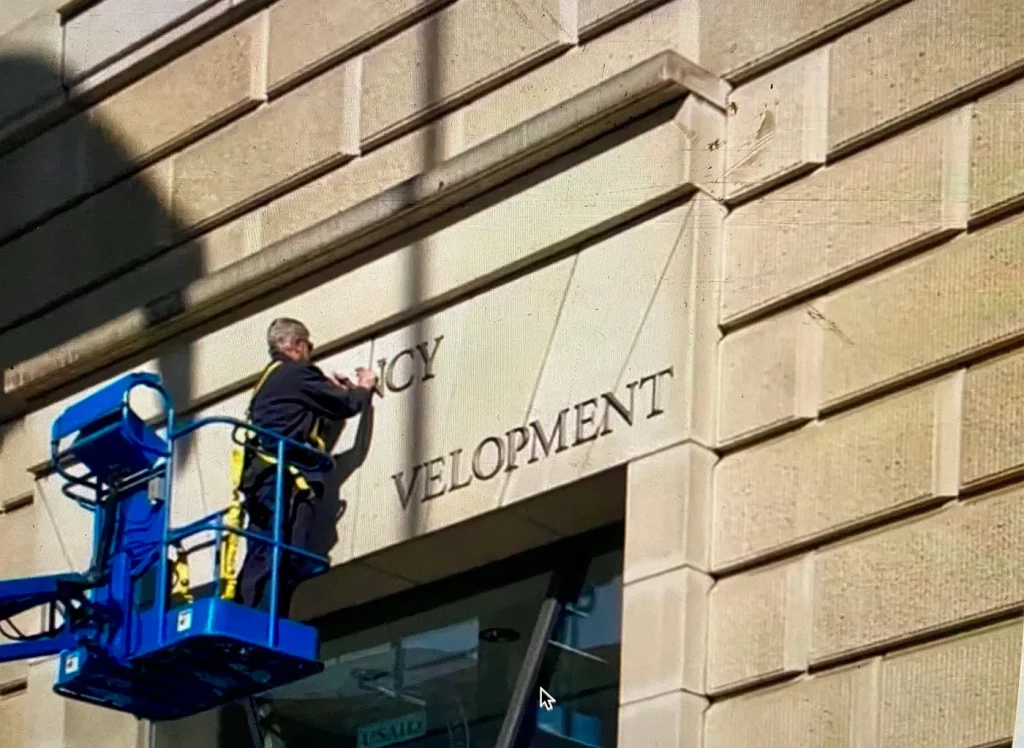By Mmanti Umoh

“The partnerships that will define Africa’s future cannot be built on convenience or profit alone. They must be anchored in shared purpose, mutual respect, and a commitment to serve, not just to succeed.”
For decades, Africa has stood at the crossroads of two competing narratives. On one hand, the continent is branded as a land of potential, rich in natural resources, talent, and market opportunity. On the other, it is described through the language of fragility: governance deficits, infrastructure gaps, economic volatility.
The truth lies somewhere in the tension between these realities. Within that space, a new model for collaboration must emerge — a model not just of public-private partnership, but of values-driven public-private purpose.
In a continent where the urgency for development often outpaces the integrity of implementation, we must revisit the very foundation of how governments, private actors, and civil society engage. Not just that we partner, but how, why, and to what end.
Because without alignment on values, even the most well-funded partnerships can become extractive, exploitative, or ineffective.
Rethinking the “PPP” Paradigm: More Than Capital and Capacity
Public-Private Partnerships (PPPs) are typically evaluated through the lens of risk-sharing, efficiency gains, and financial leverage. Governments bring policy authority and scale; private firms bring investment and innovation. It is a model designed to accelerate outcomes while minimizing public sector burden.
But in Africa, where development is not only a technical process but a deeply human and political one, this model is insufficient without a moral compass.
Yes, we need capital. Yes, we need innovation. But we also need clarity of purpose.
Who defines the “public good” in a PPP?
What values govern how decisions are made?
Who benefits, and who is left behind?
Too often, these questions are not asked. Or worse, they are considered inconvenient.
We must expand the definition of “success” in partnerships to include ethical alignment, social equity, and long-term legitimacy, not just economic return.
When Power Is Unchecked, Purpose Becomes Performative
One of the most dangerous dynamics in African development is when power becomes concentrated in the hands of a few, whether state actors or private monopolies, without systems of accountability. In such contexts, partnerships become transactional rather than transformational.
Consider the infrastructure project awarded without transparency, the data-sharing agreement signed without public consultation, or the education platform deployed without regard for cultural or linguistic inclusion.
These are not simply bad deals. They are missed opportunities to build trust.
True partnership must involve more than signing contracts. It must involve co-designing vision, co-owning responsibility, and co-defining success with communities, not just consultants.
In other words: we cannot keep solving public problems through private logics.
Purpose-Driven Partnership: What It Actually Requires
To move from opportunistic collaboration to transformational partnership, African leaders and investors must be willing to do the hard work of aligning values with vision. That means:
1. Transparency Before Transaction
Partnerships must begin with open dialogue, not behind closed doors, but in public spaces where citizens can see, understand, and question what is being done in their name. Hidden agendas erode public trust. Open processes invite public confidence.
2. Equity Over Efficiency
A partnership that delivers results while deepening inequality is a failed partnership. Equity must be baked into the design, ensuring marginalized voices are not only consulted but centered.
3. Long-Term Value Over Short-Term Wins
Quick wins make for good headlines. But development is generational. Partnerships must be designed with durability in mind, with structures for iteration, evaluation, and course correction.
4. Local Intelligence, Not Imported Ideology
Many public-private models are imported wholesale, with little adaptation to local contexts. That must change. We must trust African expertise, not just in the boardroom, but on the ground. Community insight is not a soft input; it is strategic intelligence.
The Role of African Governments: From Gatekeepers to Stewards
For public-private partnerships to be values-aligned, governments must do more than facilitate; they must lead with vision. This means becoming stewards of the public interest, not just brokers of foreign investment.
Regulating with clarity and fairness.
Monitoring implementation beyond project launch.
Ensuring citizens can access remedies when harm is caused.
Stewardship is not about micromanaging. It is about anchoring every partnership in public accountability. African states must build the institutional muscle to not only attract investment but to govern it well.
The Responsibility of the Private Sector: Profit with Conscience
Similarly, the private sector must move beyond the language of “CSR” and begin to view social impact as core to business strategy. Investors and entrepreneurs in Africa must ask themselves:
Are we building resilience or dependency?
Are we investing in long-term capacity or just short-term contracts?
Are we operating as guests or as co-builders of Africa’s future?
Being values-driven does not mean being unprofitable. It means recognizing that profit without purpose is ultimately unsustainable — economically, socially, and politically.
A company that invests in Africa without investing in Africans will eventually face resistance. Those who build with communities, not just for them, will build longevity.
The Missing Middle: Civil Society as Translator and Watchdog
Often excluded from PPP conversations, civil society organizations have a crucial role to play — not only in advocacy but in translation.
They understand the granular realities on the ground. They bring lived experience, data from the field, and the ability to speak truth to both state and capital. They can bridge the gap between ambition and accountability, between policy and people.
A healthy partnership ecosystem needs these voices, not as afterthoughts but as co-creators.
The Big Idea: Partnership Is a Governance Act
At its core, partnership is a decision about power — how it is shared, who it serves, and what values guide its use. It is not merely a technical mechanism. It is a governance act.
When public and private actors come together, they are not just executing a project. They are shaping the fabric of how development is imagined, delivered, and experienced.
That means the ethics of that partnership must be as sound as the economics.
Reimagining Partnership in the African Century
Africa’s future will be shaped not by whether we attract investment, but by how we align power with purpose.
We must stop measuring progress solely in kilometers of road built, megawatts generated, or digital platforms launched. These are important, but they are not the full story.
Let’s start measuring:
- How many partnerships led to policy reform, not just project completion
- How many communities felt respected, not just resettled
- How many youth saw themselves as co-creators, not just beneficiaries
Because ultimately, the question is not just: Did we build?
But: What did we build, and who did it serve?
The time has come to elevate partnership to what it truly is: a bold act of shared responsibility, a tool for generational justice, and a test of our collective values.
Africa doesn’t need more deals.
It needs better ones.
And better begins with power aligned to purpose, and purpose guided by people.


